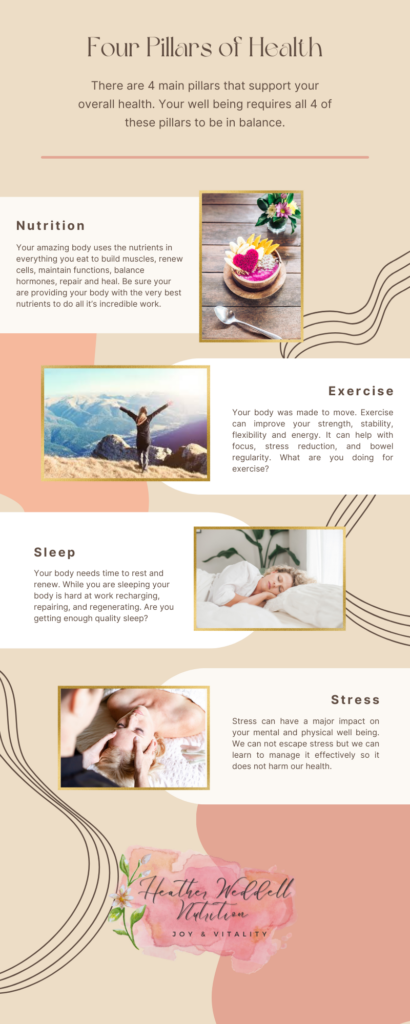
Have you been hearing more lately about metabolic health? Or maybe you have heard about metabolic syndrome? You may be wondering what on earth metabolic health actually is and if it is something you even need to concern yourself with.
What is Metabolic Health?
First, let’s be clear that metabolism and metabolic health are two separate things. Metabolism is your body’s process of breaking down foods you eat and converting them to energy. While this is related to metabolic health, it is not actually one of the markers.
Metabolic health is clinically assessed with 5 different measurements:
- Waist circumference
- Fasting glucose
- Systolic blood pressure
- Triglycerides
- HDL cholesterol
These 5 key measurements indicate the level of your metabolic health. Ideally, you want all five within the healthy range. If you have 3 or more outside of that range, you have what is known as metabolic syndrome. Metabolic syndrome increases your risk of developing chronic diseases like Type 2 diabetes, heart disease, and stroke. Having metabolic syndrome can significantly reduce your quality and length of life.
While weight can give you an idea of your health risks, your metabolic health is important because it tells us more about what’s actually going on in your body. It shows how your body is processing fats and sugar in your diet, and how it’s responding to insulin.
What if I only have 1 or 2 metabolic measures out of range?
Even if you don’t clinically have metabolic syndrome, that doesn’t necessarily mean you are metabolically healthy. That’s because metabolic health is a spectrum – not something you either have or don’t. There is a wide range of things that happen between being in good health and developing diabetes or obesity. Plus, often the symptoms of metabolic sickness go unnoticed or don’t show up until your condition is severe. So even if you feel fine or don’t notice any warning signs, having just one of the 5 measures outside the healthy range can have short-term and long-term effects on your health.
What are the symptoms of poor metabolic health?
Many of the markers of poor metabolic health, like high blood pressure or raised glucose, can only be picked up on tests. They won’t usually have any noticeable signs or symptoms. You may only notice them if they start to cause problems like diabetes or heart and circulation problems.
Symptoms of diabetes include:
- needing to urinate more often
- being very thirsty
- losing weight without trying
- fatigue – feeling tired or lethargic
- blurred vision
- slow-healing cuts and bruises
- frequent or recurring illness
Symptoms of heart and circulation problems include:
- pain in your chest (angina)
- pain in your legs when you’re walking
- fatigue
- shortness of breath
- numbness and tingling in extremeties
- swollen ankles
- dizziness
How can I improve my metabolic health?
The good news is that you can improve your metabolic health with changes to your diet and lifestyle. But is all starts with understanding your unique biochemistry and what works for you. That is why the Metabolic Balance program is such a success for my clients. We start with a comprehensive assessment of your current diet, health and lifestyle, plus we test over 30 blood values to give us a full picture of your current biochemistry and needs.
We then use that data to create your personalized nutrition plan. This ensures that your body is getting exactly the nutrients it most needs for optimal health. Of course, there is more to health than your diet. That is why the full support and personal coaching included in the program covers the 4 pillars of health: nutrition, exercise, sleep, and stress.
Improving Health with 4 Pillars
Nutrition: This has the most significant impact on your metabolic health. Eating a diet that’s full of fibre-rich vegetables and fruit, lean protein, and healthy fats is integral to a healthy lifestyle. Doing the opposite -eating processed foods and refined sugars – can have serious detrimental effects on your metabolic health.
Eating a nutritious, balanced diet composed of colourful vegetables, fibre, lean proteins, and healthy fats — while avoiding processed foods and refined carbs — is the most important to way to stabilize your glucose levels. This is key to preventing insulin-resistance. Remember, your fasting glucose level is one of the five measurements of metabolic health. When fasting glucose is out of range, you increase your risk of metabolic health problems and even metabolic syndrome.
Exercise: Getting enough exercise — especially resistance or strength training — is key for heart health (which is inseparable from metabolic health) and increasing muscle mass. This helps regulate hunger levels, glucose regulation, and body composition. It can also improve insulin sensitivity.
Sleep: Practicing good sleep hygiene (getting enough sleep and sticking to a consistent sleep schedule) is critical to metabolic health. Poor sleep can make you less insulin sensitive, increase your stress, and cause you to make poor choices.
Stress: The stress hormone, cortisol, actually makes you temporarily insulin resistant. This is alright if you are experiencing short-term stress, but chronic stress leads to increased insulin resistance and inflammation. This is very bad news for your metabolic health.
Addressing your Metabolic Health Concerns
There is a lot of information available on the internet for all sorts of health concerns and issues. Unfortunately, there is plenty of misinformation mixed it that can be hard to identify. Plus, you will find plenty of conflicting information. This is because you are looking at generalized recommendations – many of them from people who found something that worked for them. Well, that doesn’t mean it is the right solution for everyone. In fact, what is beneficial to one person could be a health disaster for another person. No two people are alike and each body will react differently to recommendations.
Remember that your biochemistry is unique to you. Cut through the hype, skip the frustration of sorting through truckloads of confusing information and just get to focusing on you. That is what I do as your holistic nutritionist. I encourage you to start with a complimentary Clarity Call to discuss your concerns and ask your questions. I will help clarify your options and provide you with recommendations that are best suited to your specific needs. Your health is your most precious resource – invest in it wisely.


Leave a Reply